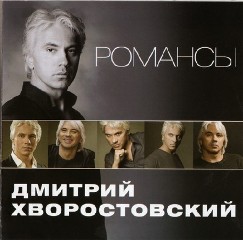Dmitry Hvorostovsky – Romances (2011)
Dmitry Hvorostovsky – Romances (2011)
Дмитрий Хворостовский - Романсы (2011)

01. Я помню чудное мгновение (Ya pomnyu chudnoe mgnovyenye) 02. Я встретил Вас (Ya vstrechil vas) 03. Однозвучно гремит колокольчик (Odnozbychno gremit kolokolchik) 04. Утро туманное (Utro tumannoe) 05. Гори, гори, моя звезда (Gori, gori moya zvezda) 06. В крови горит огонь желанья (V krovi gorit ogon zhelanya) 07. Ночь светла (Noch svetla) 08. Но я Вас все-таки люблю (No ya Vas vse-taki lyubila) 09. Очи черные (Ochi chornye) 10. Соловей (Solovey) 11. Ах ты, душечка (Akh, ty, dushenka) 12. Я Вас любил (Ya Vas lyubil) 13. О, если б мог выразить в звуке (O, esli b mog vyrazit v zvuke) 14. Жалобно стонет ветер осенний (Zhalobno stonet veter osenniy) 15. Прощай, радость (Proshchay, radost) 16. Коробейники (ой полна, полна коробушка) (Korobeyniki) 17. Выхожу один я на дорогу (Vihozhu odin ya na dorogu) 18. Свиданье (в час, когда мерцанье) (Svidanye) 19. Песнь ямщика (Pyesn yamshchika) 20. Средь шумного бала (Sred shumnogo bala) 21. Забыть так скоро (Zabyt tak skoro) 22. Урну с водой уронив (Urnu s vodoy uroniv) 23. Редеет облаков летучая гряда (Redeyet oblakov letuchaya gryada) 24. Ночь (Noch) 25. Ни слова, о, друг мой (Ni slova, o drug moy)
Known for captivating song recitals, lyrical performances of Verdi baritone roles, and, not least of all, his striking silver hair, Dmitri Hvorostovsky has enjoyed an A-list career since he emerged in the early 1990s. His brilliant, yet deceptively dark-hued voice is the embodiment of chiaroscuro, and the combination of vocal polish and emotion that he brings to his performances has made him an audience favorite. Having grown up, studied, and debuted (as Marullo in Rigoletto) in his hometown of Krasnoyarsk, he took top honors at the 1987 Glinka National Competition, the 1988 Toulouse Singing Competition, and then the 1989 Cardiff Singer of the World competition. The last of these, in which he edged out both the meteoric Bryn Terfel and Monica Groop for the win, launched him into the spotlight and led to his western operatic debut, as Yeletsky in Tchaikovsky's The Queen of Spades in Nice. The next several years brought debut recitals in London and New York, his Italian debut as Eugene Onegin at the famous La Fenice, and engagements at Covent Garden, the Metropolitan Opera, the Chicago Lyric Opera, and the Berlin State Opera. His first solo recording contract, with Philips, began in the early 1990s, as well; the artistic and commercial success of his first several CDs, and the explosion of his operatic and concert schedule around the world, sent his career into high gear.
Although he is closely identified with the roles of Eugene Onegin and Yeletsky (The Queen of Spades), Hvorostovsky's operatic repertory is centered on Italian works more so than Russian; in the early 2000s, he began to explore new Russian territory, like Prokofiev's War and Peace, but in general he feels Russian roles call for a gruffer, less lyrical voice than his. He is known best for his performances as the elder Germont in La traviata, Posa in Don Carlos, Don Giovanni, and Rossini's Figaro. However, as a recitalist, Hvorostovsky has always been intensely focused on Russian song, making moody, dramatic works of Rachmaninov, Tchaikovsky, Rimsky-Korsakov, Glinka, and Mussorgsky the centerpieces of his performances. With his longtime collaborator Mikhail Arkadiev at the piano, Hvorostovsky has established himself as one of the finest singers of that repertory anywhere in the world. The special nature of that collaboration was honored by Russian composer Georgy Sviridov in 1995, when he dedicated his vocal poem Petersburg to Hvorostovsky and Arkadiev; the two have remained champions of his music. Since the turn of the twenty-first century, Hvorostovsky das devoted himself more and more to Verdi roles. --- Allen Schrott








